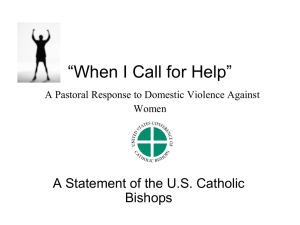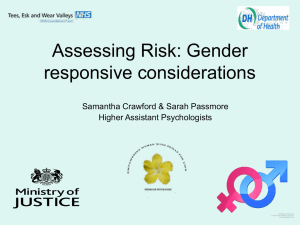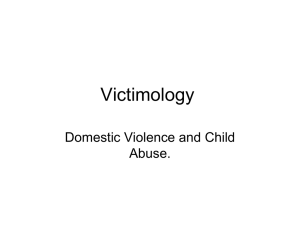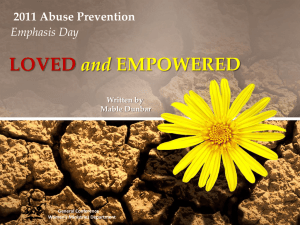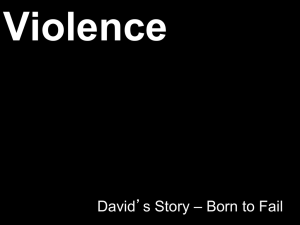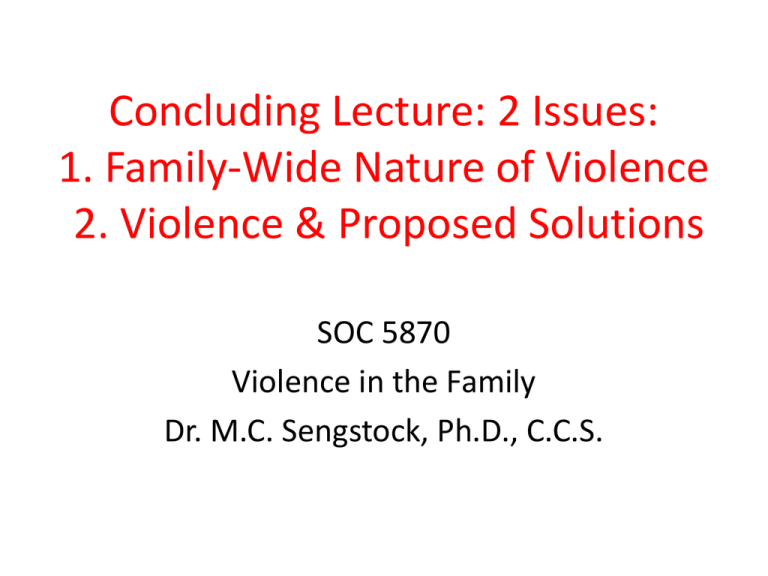
Concluding Lecture: 2 Issues:
1. Family-Wide Nature of Violence
2. Violence & Proposed Solutions
SOC 5870
Violence in the Family
Dr. M.C. Sengstock, Ph.D., C.C.S.
1. Family-Wide Nature of Violence
Social Heredity of Violence
• Analysis of the 1st National Survey on Family
Violence
• Examining Data on Violence of the
Respondents & Their Parents
• Comparing Rates of Violence from the
Different Generations
Methodology
• Respondents – “Parents” Were Asked About Their
OWN Violent Behavior in Their Homes
– Against Each Other & Against Their Children
• Respondents – “Parents” Were Also Asked About
Their Memories of Their Own Parents’ (The
“Grandparents”) Violent Behavior in Their
Childhood Homes
– Against Each Other & Against Their Children (the
“Parents”)
(No Direct Information on the Grandparents)
Results – Rates of Spouse Abuse
• Grandparents:
– Men: 1/7 (13%) Were Violent to Partner
– Women: 1/12 (8%) Were Violent to Partner
• Parents:
– Men: 1/7 (13%) Were Violent to Partner
– Women: 1/8 (12.5%) Were Violent to Partner
• Question: Is There a Difference?
Correlations: Spouse Abuse
• Does Parental Spouse Abuse Children
Abusing Spouse?
• Men With Violent Parents:
– 3x As Likely to Hit Own Wives
– 35% vs. 10.7% of Those With Non-Violent Parents
• Women Who Saw Parents Abuse:
– 3x As Likely to Hit Own Husbands
– 26.7% vs. 8.9% of Those With Non-Violent Parents
Correlations: Severe Spouse Abuse (Beatings)
• Men:
– Raised in Violent Families Have a Wife-Beating Rate
Which is 1,000% Greater Than Men From Non-Violent
Families
• Women:
– Raised in Violent Families Have a Husband-Beating
Rate Which is 600% Greater Than Women From NonViolent Families
• NOTE: Fathers’ & Mothers’ Violence Have An =
Impact on BOTH Boys & Girls – e.g., NOT Affected
By Gender
Rates: Child Abuse
• Compare Physical Punishment by
Grandparents to Parents’ Behavior Towards
Grandchildren
• Parents: Hit Teenaged Children – 35%
• Grandparents: Hit Parents as Teens – 37.3%
• Conclusion: Child Abuse Changed Little From
One Generation to the Other
Are Parents Who Were Punished
More Likely to Punish?
• NO – Because Everyone Punishes!
• Are Parents Who Were Punished More Likely
to Punish Severely?
• BOTH Mothers & Fathers:
– Those Punished As Children:
– 1/4 (25%) Abused Children Severely
– NOT Punished As Children:
– 1/10 (10%) Abused Children Severely
Gender Impact of Parents
•
•
•
•
•
•
•
•
SAME SEX Parent Punishment More Influential
GrandFATHER Hits Son
Son Abuses Grandchildren
No Effect If Grandfather Hits Daughter
GrandMOTHER Hits Daughter
Daughter Abuses Grandchildren
No Effect If Grandmother Hits Son
Apparently They Model Gender Related
Behavior
Physical Punishment:
Effect on Later Spouse Abuse
•
•
•
•
•
•
•
Parents NOT Hit As Kids:
1/6 Had Violent Marriages
Parents Who WERE Hit As Kids:
1/4 to 1/5 Had Violent Marriages
Severe Abuse – Beatings:
Parents NOT Hit As Kids: 2% Beat Spouses
Parents Hit As Kids: 4x As Many Beat Spouses
(8%)
Effect of Child Abuse on Later Parent Abuse
•
•
•
•
•
•
Not Elder Abuse – Parent Abuse in Childhood
18% of Children (3-17) in Study Had Hit Parent
(Since Only 1 Parent Interviewed, Could be 2x)
Correlation:
Children Not Hit: 1/400 (0.25%) Hit Parent
Children Hit: 1/2 (50%) Hit a Parent
Double Whammy
• People Who Were BOTH Abused Children
• AND Saw Parents Abuse Each Other:
• These Are the MOST VIOLENT MARRIAGES:
– Most Likely to Hit Children
– Most Likely to Hit Spouses
– Most Likely to Abuse Children Severely
– Most Likely to Abuse Spouses Severely
– Most Likely to Have Severe Sibling Violence
Lessons Taught By Violent Families
• Violence Begets Violence: Love = Hit
• Those Who Love You Most – Hit You Most
– If I Love, I Must Hit; If He Loves Me, He’ll Hit Me
– EX: Nursery School: “I Like Him”; Teen “Friend”
• Hitting Is Morally Right
– Correct Behavior; Avoid Injury; Achieve Morality
• Violence Is OK When Nothing Else Works
– Kids Learn to Use It Themselves Later
2. Solutions: Differing Views
on Violence
• Bettelheim: “Release It!”
• Teach Everyone to Express Violent Tendencies
• Otherwise They’ll “Build Up” & Then “Erupt”
– Slaughtered 12 Nurses; Boys in Milwaukee
– Old Traditions: Slaughter Pigs; Burn Witches
• We Need to Do This More – Too Much Tension
– School Raises Tension – Sit Still – Keep Clean – Sports
Releases Tension – Also Raises It
• Need to Let People Release Tension
– Scary Stories – Read Violent Words – Empty Out
Negative Feelings – Let Good Feelings Flow In
Recommended Solution
• Bach & Wyden: “Teaching Intimates to Fight”
• Intimates MUST Fight – If They Don’t …
• “Bad Fights” – Crude & Hurting – Result:
– Kitchen Sink Fights
– Gunny-Sacking – Everything Brought Up
– Psychiatric Museums – No Holds Barred
– Shaking the Money Tree – Money Attacks
– Dropping the Bomb on Luxemburg
Bach & Wyden Solution (ctd)
• WORST Fights:
• No Fights At All
–
–
–
–
–
–
–
–
Anything You Want
Speech Is Silver, Silence Is Golden
Can’t Stand Hassling
You Should Know How I Feel
Silent Treatment
Fighting Not Gentlemanly/Ladylike
Be Nice
I Can’t Take You Seriously When You’re Angry
Back & Wyden Solution (ctd)
• Best Fights:
– In Front of Kids, Friends
– Before, During, After Sex
– Keep Arguments Fair
– Be Balanced – Old Hurts Aren’t Recalled
– “I” Statements vs. “You” Statements
• “Good” Fights Accomplish:
– Spontaneous Statements of Feelings
– Can Change a Relationship for the Better
Solutions: Alternate View on Violence
• Bandura & Walters – “Catharsis Myth”
• Experimental Study – 2 Groups:
– Experimental: Violence Catharsis Sessions
– Control: Non-Aggressive Play Sessions
• Post Test Story: Controls Were Less Aggressive
• Del Martin, Battered Wives
• Leonard Berkowitz: “Case for Bottling Up
Rage”
Q: Is Fighting a Good Solution?
• What If There Is a Basic Philosophical
Difference? “Communication Myth”:
– Woman Wants to Work – Husband Says No
– Wife Objects to His Mother’s Visit – He’s Mad
• This Might Lead to MORE Anger & Tension –
Not Less
• National Survey on Family Violence:
– More NON-Violent Conflict More Violent
Conflict (e.g., Did NOT Decrease Violence Level)
Proposed Solution to Children’s Violence
• Behavior Modification
• Token Point System
– Discuss With Everyone
– Reward ALL Good Behavior
– NEVER Miss
• TO = Time Out
– Remove From Situation for Specified Time Periods
• Even Reluctant Fathers Admitted It Worked Better
• But What If It Doesn’t?


